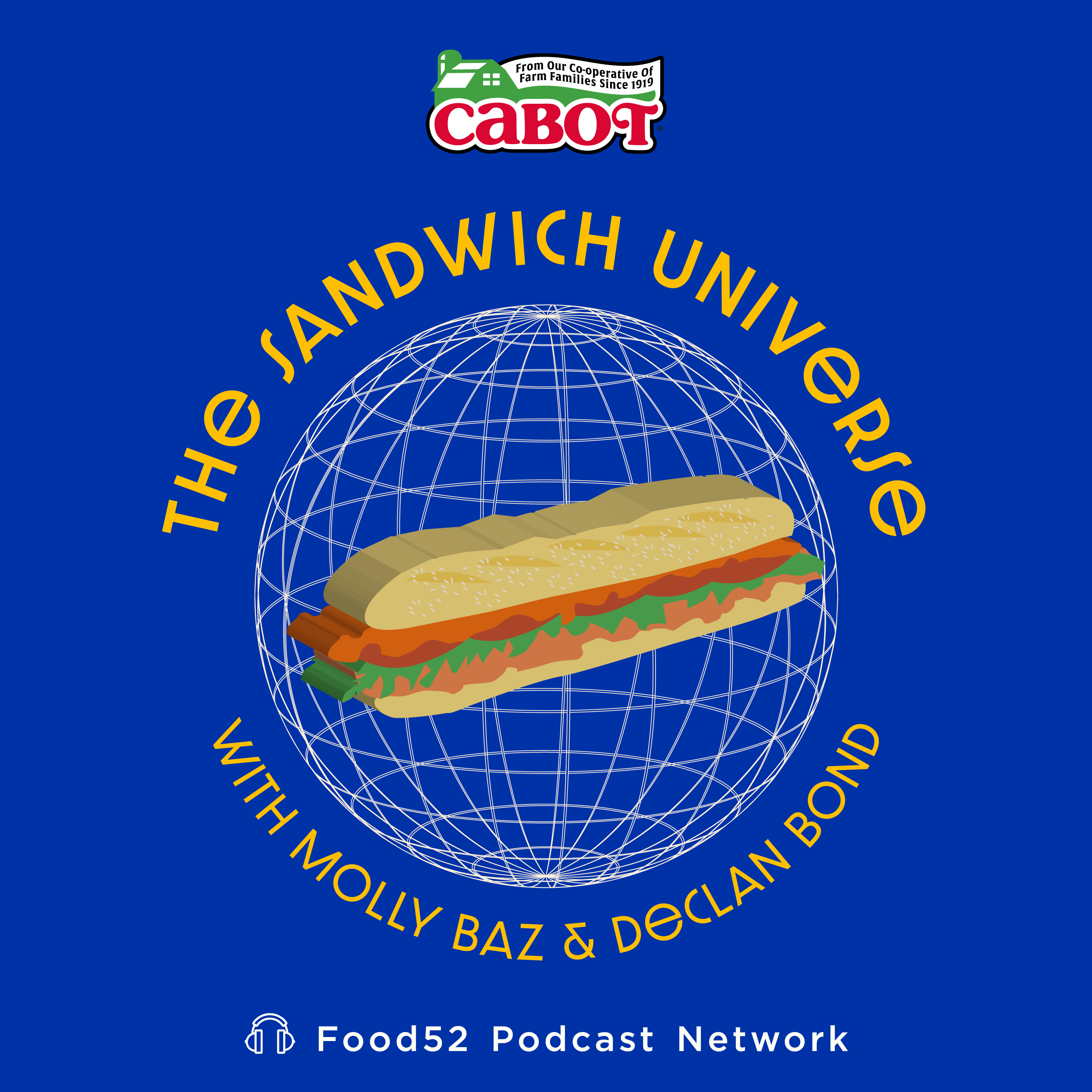
Join The Sandwich Universe co-hosts (and longtime BFFs) Molly Baz and Declan Bond as they dive deep into beloved, iconic sandwiches.
Listen NowPopular on Food52
Continue After Advertisement
30 Comments
Mye
April 18, 2018
Hi Caroline, occasionally when I found the recipe I like, I just jump right through it, but I read the entire article. Your way of writing is like a crumb, so delicate and light. It's refreshing to read. I enjoyed it. :)
Laura415
May 7, 2017
I bake gluten free. My cakes are always tender since there is no gluten to create a structure. I will use oil in a cake if it's a flavor element like an olive oil cake. However, butter in a GF cake helps the structure if you add air by creaming the butter and sugar, then whipping the eggs in to get as much air in the batter before baking. With GF baking it's good to know a little science though so thanks for this tutorial.
kim
April 27, 2017
I am sold, especially since I started making Maialino's Olive Oil Cake since you published it a few years ago. It's a favorite; and it ships beautifully because it stays moist for days and days. My son just got one for his birthday, and is requesting another. Can't wait to try more oil cakes!
Helen S.
April 27, 2017
When I first started baking professionally a long while ago, I thought I had to use butter for the best cakes. However, since I was selling wholesale the product had to last longer because no matter how much you wish it most restaurants don't sell a whole cake a night. After a lot of experimentation, I found that oil based cakes lasted much longer in the refrigerator or out for that matter. For a white cake with oil, use a white chiffon such as this one for the coconut cream cake - http://pastrieslikeapro.com/2014/10/coconut-cream-cake. There is also a Lemon Blueberry Cake using the white chiffon as well as a chocolate chiffon and orange chiffon. Our base chocolate cake was our workhorse as it could be used in endless variations and was both tender and long lived. The Espresso Fudge Cake was a good example of a non chiffon cake using oil. It can be found at http://pastrieslikeapro.com/2014/09/espresso-fudge-cake.
Helen S.
April 27, 2017
Hi Debbbi - There is 3 sticks or 340 grams, 12 ounces in the buttercream for sure. But the Chocolate Cake itself has none. Click on the link for the chocolate cake and you will see it is made with oil only. I was referring to the cake not, the buttercream or glaze since we were talking about cakes made with oil. This was one of our top sellers at the bakery.
Helen S.
April 27, 2017
Not a problem - just wanted to make sure you saw the cake. Thanks for letting me know.
C
April 26, 2017
Has anyone ever successfully used oil in a vanilla/white cake recipe? Or does oil work best in chocolate cakes?
Cecilia
June 20, 2017
My favorite white cake recipe is oil-based! http://www.sweetamandine.com/2009/04/to-pistol-packin-patriot-on-his-26th.html
My favorite vanilla/white cakes are all chiffon-cakes, which all use oil, or a combination of oil and butter. Simply do a search for a yellow/white chiffon cake and you're sure to come up with a wealth of options!
My favorite vanilla/white cakes are all chiffon-cakes, which all use oil, or a combination of oil and butter. Simply do a search for a yellow/white chiffon cake and you're sure to come up with a wealth of options!
HalfPint
April 26, 2017
I've always preferred oil cakes because they have a much softer texture.
That's why Hershey's Perfect Chocolate cake (made with oil) is my go-to chocolate cake recipe.
Obviously, butter all the way for pound cakes and frosting :)
That's why Hershey's Perfect Chocolate cake (made with oil) is my go-to chocolate cake recipe.
Obviously, butter all the way for pound cakes and frosting :)
Mona P.
April 25, 2017
Anyone have the recipe for the doctored cake mix chocolate cake with the marmalade that the author references? I want to try that one!
Cecilia
April 23, 2017
I've always preferred the texture of oil cakes (chiffon cake when I want vanilla); my understanding, however, is that this is not simply a function of the oil coating the flour and inhibiting gluten formation, but, rather, the temperature at which oil/butter is solid. For a cake you'd like to eat chilled (which is my preference for all cakes, really), you want to use a fat that is liquid at lower temperatures for a moisture mouthfeel; this is why butter cakes/yellow cakes tend to taste dry to me.
In fact, if your goal is, as the article mentions, coating the flour with fat efficiently, you can use butter to similar effect by creaming the butter together with the flour and sugar very well before adding a drop of liquid (I believe that this is sometimes called the "reverse creaming" method). While butter does have a small amount of water, if you keep the butter solid while doing this, you shouldn't have to worry about that water binding with the flour to create gluten. Of course, some gluten is necessary for structure and lift--otherwise, you would end up with a very dense cake (this is often why oil cakes add extra leaveners--to compensate for less gluten formation and also to compensate for the lack of an air bubble network created by creaming butter and sugar together). But, again, sometimes you want a dense, fudgy texture. That's why I love understanding the science behind baking--it really lets you tune ingredients/methods to get exactly what you want!
In fact, if your goal is, as the article mentions, coating the flour with fat efficiently, you can use butter to similar effect by creaming the butter together with the flour and sugar very well before adding a drop of liquid (I believe that this is sometimes called the "reverse creaming" method). While butter does have a small amount of water, if you keep the butter solid while doing this, you shouldn't have to worry about that water binding with the flour to create gluten. Of course, some gluten is necessary for structure and lift--otherwise, you would end up with a very dense cake (this is often why oil cakes add extra leaveners--to compensate for less gluten formation and also to compensate for the lack of an air bubble network created by creaming butter and sugar together). But, again, sometimes you want a dense, fudgy texture. That's why I love understanding the science behind baking--it really lets you tune ingredients/methods to get exactly what you want!
Cecilia
April 23, 2017
I've always preferred the texture of oil cakes (chiffon cake when I want vanilla); my understanding, however, is that this is not simply a function of the oil coating the flour and inhibiting gluten formation, but, rather, the temperature at which oil/butter is solid. For a cake you'd like to eat chilled (which is my preference for all cakes, really), you want to use a fat that is liquid at lower temperatures for a moisture mouthfeel; this is why butter cakes/yellow cakes tend to taste dry to me.
In fact, if your goal is, as the article mentions, coating the flour with fat efficiently, you can use butter to similar effect by creaming the butter together with the flour and sugar very well before adding a drop of liquid (I believe that this is sometimes called the "reverse creaming" method). While butter does have a small amount of water, if you keep the butter solid while doing this, you shouldn't have to worry about that water binding with the flour to create gluten. Of course, some gluten is necessary for structure and lift--otherwise, you would end up with a very dense cake (this is often why oil cakes add extra leaveners--to compensate for less gluten formation and also to compensate for the lack of an air bubble network created by creaming butter and sugar together). But, again, sometimes you want a dense, fudgy texture. That's why I love understanding the science behind baking--it really lets you tune ingredients/methods to get exactly what you want!
In fact, if your goal is, as the article mentions, coating the flour with fat efficiently, you can use butter to similar effect by creaming the butter together with the flour and sugar very well before adding a drop of liquid (I believe that this is sometimes called the "reverse creaming" method). While butter does have a small amount of water, if you keep the butter solid while doing this, you shouldn't have to worry about that water binding with the flour to create gluten. Of course, some gluten is necessary for structure and lift--otherwise, you would end up with a very dense cake (this is often why oil cakes add extra leaveners--to compensate for less gluten formation and also to compensate for the lack of an air bubble network created by creaming butter and sugar together). But, again, sometimes you want a dense, fudgy texture. That's why I love understanding the science behind baking--it really lets you tune ingredients/methods to get exactly what you want!
rob
April 23, 2017
Been in the baking business for over 40 years. Butter is delicious in a cake. BUT it will make the cake firmer. I have nearly always substituted about 20% of the butter out for oil in a yellow or pure white cake, one can go as high as 33%, the oil will help carry some of the butter flavor, and will always make the cake more moist, however, I do stick with 4% milk. Chocolate cakes are VERY frequently made with oil and water, not an ounce of butter, except in the frosting. I use hot fresh triple-strong coffee instead of water. Wonderful flavor, very soft, tender cakes.
Cait
April 23, 2017
I need the recipe for the stunningly beautiful cake in James Ransom's photo in this article. Is there someone who can help a gal out!?
Cait
April 23, 2017
Aaaaaand, with the help of a creative (ahm, common sense) google search: https://food52.com/recipes/34817-perfect-chocolate-cake
Matt
April 23, 2017
Chiffon cakes—baking powder and egg risen cakes with oil as the fat—have a very neat history as the most recent cake invention in 100 years. Surprised that they weren't mentioned in this article.
Windischgirl
April 22, 2017
Thanks for this article! I figured that the form of the fat at room temperature would reflect the texture of the baked good, so that butter-based cakes would be firmer and denser than oil-based cakes. Plus it is fun to play with the flavor of the fat in contrast with the other ingredients! How about walnut oil in a carrot cake, or avocado oil in chocolate cake? Mmmmmm...
Windischgirl
September 13, 2017
I actually did a side-by-side with an old family recipe. I personally prefer the Revisited version with oil, but I'd appreciate feedback on what others think.
https://food52.com/recipes/32610-mrs-shunke-s-apple-kuchen
https://food52.com/recipes/32477-mrs-shunke-s-apple-kuchen-revisited
https://food52.com/recipes/32610-mrs-shunke-s-apple-kuchen
https://food52.com/recipes/32477-mrs-shunke-s-apple-kuchen-revisited
Fresh T.
April 22, 2017
I actually knew this one! I'm patting myself on the back.... don't worry the smugness will pass in a second. Every now and then I get to "yay!"
Victoria B.
April 22, 2017
Thanks for the tip. Where would I find the recipe for the dark chocolate cake in the article? I might have to make that for my husbands birthday next week!
chris
April 22, 2017
I was searching for the link, too! The dark chocolate cake sounds lovely ... did we overlook the recipe?
Elizabeth
April 23, 2017
Thank you for that bit of scientific knowledge! As someone who's on a gluten free diet...I now know why my homemade almond butter cookies seem so beneficial.












Join The Conversation